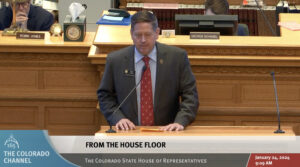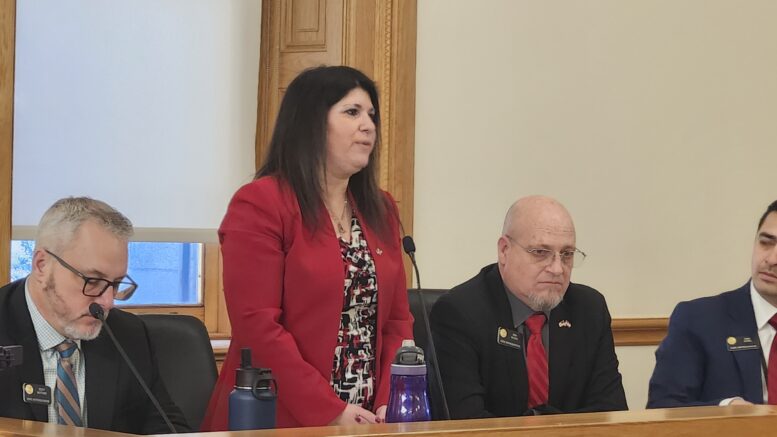Colorado House Republicans on Thursday chose a business advocate and longtime oil-and-gas industry supporter to serve as their new House leader in an election that pitted candidates with starkly different views of industry against each other.
Rep. Rose Pugliese of Colorado Springs will lead the 19-member minority caucus after defeating both Delta Rep. Matt Soper and follow Colorado Springs Rep. Ken DeGraaf in a two-tiered contest. She replaces Rep. Mike Lynch of Wellington, who resigned his leadership post but not his seat after a 2022 conviction for driving while ability-impaired came to light in recent weeks due to reporting from the Denver Post.
Pugliese, a second-year representative and former Mesa County commissioner who was selected as assistant minority leader by the caucus in November 2022 before she’d even been sworn in, spent her first year focused on business and education issues. She co-sponsored a law last year that set aside $40 million in tuition-free assistance for students and adult learners seeking to enter high-demand industries like construction and nursing, and she served as a leading voice in fighting proposed new regulations.
Pugliese also is one of the major fundraisers for House Republicans — a fact acknowledged by one of her competitors for the seat — and vowed to continue in that work as the GOP looks to narrow a 46-19 deficit in seats in the chamber during the 2024 election. She told caucus members on Thursday that her biggest aims are to work with legislators across the sometimes ideologically fractured caucus and to grow Republican numbers to give the party more of a voice in policy debates.
Keeping a similar focus for caucus
“It’s really important to me that we have a strong caucus, that we get out of the super-minority and have a strong presence in this state,” Pugliese said.
For the position, Pugliese faced off against DeGraaf, one of the most vocal members of the caucus’ highly conservative wing, and Soper, a more moderate voice who often is considered the House Republicans’ go-to member on legal issues. She received eight votes against six for Soper and five for DeGraaf in the first round of voting and then out-tallied Soper 11-8 in a runoff between the two highest vote-getters.

Colorado state Rep. Ken DeGraaf (center) looks up after completing his speech during House Republican leadership elections on Thursday.
The contrast in approaches to the business community was on display in the speeches that the candidates gave before voting. While Pugliese is known for her business advocacy and Soper listed regulatory rollbacks as a top priority, DeGraaf said the caucus needs to focus on the liberty of Colorado residents more than the protection of businesses.
“Our party is moving from industrial to individual sovereignty,” DeGraaf said. “The purpose we took in our oaths was not to prop up industry but to uphold the values of the individual.”
The state of the House
Lynch last year brought some cohesion to a caucus that was highly divided under former House Minority Leader Hugh McKean between its conservative and more pragmatic wings. She received laudations from Rep. Don Wilson, the Monument Republican who nominated her on Thursday, for being “willing to work with all of the caucus,” but even if she can unify the group, her job is not an easy one.
Democrats hold a veto-proof majority after flipping five seats in the 2022 election, and Republicans must get at least 14 of that party’s 46 members to cross the aisle with them to pass or block any contentious legislation. While Democrats are dealing with an increasing split between their progressive and moderate members, most of the business-opposed bills that underwent major changes or died last year had those alterations made in the Senate by a moderate Democratic wing that holds more power in that chamber.
Pugliese has introduced two bills thus far in the two-week-old 2024 legislative session. One — House Bill 1065, which she is sponsoring with GOP Rep. Scott Bottoms of Colorado Springs — seeks to reduce the state income-tax rate from 4.4% to 4%, a proposal that is almost sure to die in its first hearing in the House Finance Committee.
Lynch’s exit as leader

Colorado state Rep. Mike Lynch announces his resignation as House minority leader during a speech on the House floor Wednesday.
Lynch did not speak during the meeting to elect his replacement.
But during a short address in the House Wednesday, the small-business owner denied he was stepping down because of pressure from Colorado Republican Party chairman and former state Rep. Dave Williams, a close ally of the caucus’ conservative wing. Instead, Lynch said his action, coming after he survived a close vote of no confidence on Monday, was needed to refocus House Republicans, and he warned others not to get behind the wheel of a car after drinking.
“I am stepping down because this is the right thing to do, because I’m becoming a distraction from my caucus and it is getting in the way of the hard work we have to do in this building,” Lynch said.
